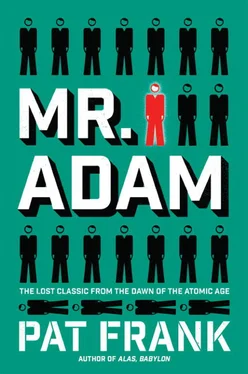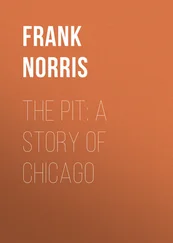“You’re out of your head,” Pell said clinically. “You’re unbalanced.”
I was going to shoot him through the middle of the chest, just under the chin, where the hem of his old-fashioned nightgown met the pallid flesh. Then I was going to shoot him again, in the same place, to make sure. “So you finished off Homer Adam,” I said. “You were very thorough, and very clever. And it was all a deplorable accident! A most deplorable accident!”
“No, it wasn’t an accident,” Pell said.
“I know it wasn’t an accident. You finished off Homer Adam, and everyone else, deliberately, just as I’m going to slam a nine-millimeter slug through you deliberately.”
He dropped back against his pillows. “All right,” he said, “go ahead.” He folded his dried, tallow-yellow hands, one against the other, and repeated, “Go ahead. I am tired. I am very tired and there is nothing more I can do. I don’t suppose it matters whether I die quickly, now, or that I live for several months or years. Please when you shoot be sure I am dead, because I do not want to die slowly.”
This was not what I had expected him to say. He was saying all the wrong things. “Tell me,” I said, “what have you and your buddies got against humanity that made you do it?”
Dr. Pell groaned. “Against humanity? Why, I haven’t got anything against humanity,” he said. “I have always felt that I’d devoted my life to humanity. I know you won’t believe it now, and considering what you know—the limitations of what you know—I can hardly blame you. Now please go ahead and shoot me.”
The Browning was beginning to feel heavy in my hand, and I felt rather ridiculous, standing there, threatening this old man. I let it fall to my side. “That doesn’t make sense. You admit that Homer Adam wasn’t sterilized by accident, and yet you say—”
“He certainly was not sterilized by accident,” Dr. Pell said, anger cracking his voice. “He did it himself!”
“Did it himself?”
“Yes, he committed what amounted to sexual suicide.”
This was a possibility that I had not considered. But it was so very possible, and so intriguing, that I knew I could not kill Pell until I found out whether it was so. I shoved the gun back into my pocket, knowing immediately that I would never shoot Pell now, and said, “Tell me about it.”
“It is all so exasperating, and so confusing, that I don’t like to discuss it,” Pell said. “I wish you would please go ahead and kill me, because if I am forced to write a paper on this business I shall certainly lose my mind.”
“What’s so exasperating and confusing?”
Pell saw that there was no chance that I would shoot him, and he said, with resignation, “I suppose I’d better tell you about it, because I don’t think you will leave until I do. In the first place, there were the complications. As you know, we only needed Adam for a few days of tests, but I was never able to get my hands on him. I found that all I was doing was attending meetings and conferences. I believe it was a conspiracy.”
“That wasn’t a conspiracy,” I said. “It was just ordinary procedure.”
“Obstacles sprouted from the streets,” Pell went on. “People sat up nights thinking up reasons why we couldn’t begin operations.”
“I know what you mean.”
“We were patient. Finally all the boards and committees and panels had approved all their plans, and Adam was delivered to the laboratory. He was calm, and in good health. We were very careful, because much of our equipment and apparatus was designed to reproduce the rays and radiations which we believe were unloosed in the Mississippi explosion. The first thing we did was warn Adam not to walk in certain areas, or go near certain machines.”
“And?”
“He was very clever. He waited until we were all distracted with something else—I believe it was the official cameraman—and then he sauntered off. By the time we found him he had sterilized himself thoroughly. He’s lucky he’s not dead.”
“Are you sure?”
“Certainly we’re sure. We made every conceivable test. It was the most bewildering, exasperating experience I’ve ever had in my life. Why did he do it?”
I said I didn’t know, but I was going to find out. I started to apologize for coming up to shoot Dr. Pell, but when I tried to form the proper words into a sentence it sounded silly, and all I said was that I was sorry things turned out the way they did, and I hoped he would soon be out of bed.
I caught an evening commuters’ train for Tarrytown, and then a cab to the gatehouse at Rosemere. The press had left its spoor, a little pile of used flashlight bulbs, on the front steps. I wondered whether Adam had told the truth, as I rang the bell, and decided probably not, because he had probably been carefully briefed on what to say before he left Washington—an accident, a most unfortunate accident.
Homer opened the door. “Steve!” he said, draping a skinny arm around my shoulders. “I was wondering when you’d get here. It’s good to see you. Hey, Mary Ellen,” he called upstairs. “Steve finally got here.”
She said she was changing diapers, and she would be down presently. “Now that we’re not working for the government any more,” Homer explained, “we had to let Mrs. Brundidge go, except twice a week.”
“Well, while we’re here alone,” I told him, “tell me why you did it?”
Homer sat down suddenly. His cranelike legs were not made to support him in moments of stress. “How did you know about it?” he asked. “I was hoping no one would know. It is a secret. Everybody said it was not only secret, but top secret, because if it got out it would cause so much trouble, and so many people would be accused of negligence. I don’t want to get anybody into trouble.”
“Don’t worry,” I said. “You’re not getting anybody into trouble. I’ve just been talking to Dr. Pell. I was about to shoot Dr. Pell, because I thought he had deliberately sterilized you, and then he said you did it yourself.”
“I did,” Homer admitted.
“But why? Were you getting back at Kathy?”
Homer glanced at the stairs. “Not so loud,” he warned. “Mary Ellen doesn’t know there was anything really serious between Kathy and me, and if she hears you mention her, she might suspect something.”
“All right, I’ll be careful,” I agreed, amused at the ignorance of the average male.
“No, it wasn’t Kathy,” he said in a low, hoarse voice.
“The way you talked about women, I thought—well, I thought you were still vengeful.”
“Oh, I think I got over that,” Homer said. “As you explained, every man gets taken once in his life.”
“Perhaps you were simply fed up with the delays,” I suggested, remembering Pell’s account of his troubles.
“Oh, no. I got used to delays when the N.R.P. had me.”
“Then what in hell was it?”
Homer began to knead his tousled mop of hair with his fingers, and I knew he was finding it difficult to answer. “I’ll tell you,” he said finally. “It was just me.”
“Just you?”
“It was just that I wanted to be like everyone else. All my life I have wanted to be like everyone else, and now I am like everyone else, and for the first time I feel completely right. You know a lot about me, Steve. You know I was always different. I was different when I was a little boy, and I was different when I was adolescent, and I was different when I grew up. Now I’m not different any more.”
I tried to sort it out in my head. “When did you decide this?” I asked.
“I’m not sure. I don’t think you decide things like that all at once. This is the kind of decision that you climb and scratch for, and when you’ve finally got it then you know it’s all yours. I knew I had reached my decision when Dr. Pell took me into the N.R.C. laboratories. I knew, then, that I was either going to be sterile, like everyone else, or I was going to be dead. I don’t know what made me decide, right at that moment. Maybe it was the machines.”
Читать дальше












